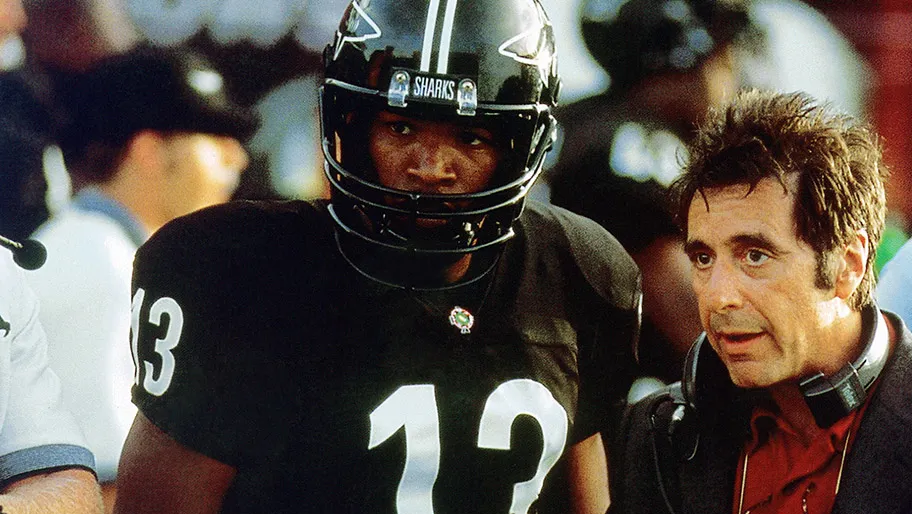On Dec. 22, 1999, Warner Bros. released the Oliver Stone-directed NFL drama Any Given Sunday in theaters, where it went on to cross the $100 million mark globally. The Hollywood Reporter’s original review is below:
Oliver Stone is one of the movies’ foremost portrayers of warfare, so it’s only logical he should turn his attention to those gladiators of sports, professional football players. Any Given Sunday is the result, a film loaded with cynicism and choking on overbearing imagery that nevertheless winds up buying into many of the myths surrounding the sport. Of two minds about nearly every issue the film tackles anyway, Stone further lets his point of view get smothered in high-impact action and turbocharged editing.
Jocks and sports-minded guys appear the most logical audience for Any Given Sunday, but even they can’t be blamed for recoiling from the visual assault. Starring Al Pacino, Cameron Diaz and a host of name actors and such ex-football greats as Jim Brown and Lawrence Taylor, Any Given Sunday can expect a strong first quarter. But as the clock winds down, the crowd may well have dwindled.
The film joins the fictional Miami Sharks at midseason, just as an injury to star quarterback “Cap” Rooney (Dennis Quaid) threatens their playoff hopes. The team’s surprising savior is Willie Beamen (Jamie Foxx), a third-string quarterback with a propensity for upchucking his lunch during games. Willie throws a few touch downs, wins a couple of games and, as this movie has it, attains instant celebrity as the star of music videos and a national magazine cover boy.
The issue of who will start once Cap recovers from his injury becomes a running battle between longtime head coach Tony D’Ama to (Pacino) and ruthless team owner Christina Pagniacci (Diaz), who, after inheriting the team from her dad, is determined to run it with unsentimental eyes focused on the bottom line.
Along the way, issues get raised about race, ego, sports medicine, college recruiting, media overkill, female groupies, performance clauses in players’ contracts and bitter divisions within the team itself. That modern-day sports suffers from these and other problems is no great surprise. But that one poor team would experience all of these problems in less than half a season is a stretch.
And Stone, acting as if he has uncovered a huge conspiracy, hammers home these points with all the subtlety of a power tool. Then, in case any soul in the audience doesn’t understand, Stone gives us boozy conversations between the coach and his defensive coordinator (Brown) about the old days and the new ways they so disapprove of.
There is no area of professional football in which Stone and fellow writers John Logan and Daniel Pyne do not see money-hungry, ego-gratifying misbehavior. Yet at the film’s heart-pounding climax, as the Sharks drive for a potential game-winning touchdown in the playoffs, the film buys into all the boyhood legends: the Knute Rockne-like locker-room speech, the hoary cliches about being a man and the importance of team.
The film’s best moments take place in the trenches, as sweating, bloodied men pound each other’s bodies over a few yards of ground. Stone amps up the sound effects until the viewer can almost feel the brutal, bone-jarring hits. But even here the law of diminishing returns kicks in as seemingly half of the film’s 160 minutes is devoted to gridiron warfare.
But for all this surface flash, the film never digs deeply into its characters. Insights belong to freshman psychology: Tony is driven by the early loss of a father; Willie never got to be son to his dad; Christina strives to be the son her father never got.
And the minute you lays eyes on James Woods’ Dr. Feelgood team orthopedist or Matthew Modine’s sensitive internist or Lawrence Taylor’s hard-nosed linebacker determined to pad his statistics, you know who these people are, and nothing ever changes nor is more revealed beyond first impressions.
Salvatore Totino’s cinematography and Victor Kempster’s production design are eye-catching. But in the end, it’s too much of a good thing. — Kirk Honeycutt, originally published on Dec. 20, 1999



